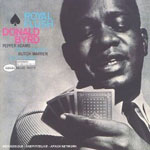Home » Jazz Articles » Multiple Reviews » Blue Note RVG Editions: Totally Tenors and Trumpets
Blue Note RVG Editions: Totally Tenors and Trumpets
 Johnny Griffin
Johnny Griffin
The Congregation
Blue Note
1957
Although his tenure with Blue Note was brief, Johnny Griffin nonetheless made the most of the early exposure, making a name for himself when John Coltrane and Sonny Rollins were the favored tenor saxophone stars of the period. This quartet session from 1957 is not so much a major statement as it is a solidifying project that presents some of Griffin's most admirable qualities. Known for his speedy improvisations and dazzling technical displays, Griffin plays it a bit on the cool side here, with most of the tunes taken at a medium gait. Still, there's much to enjoy, from the spicy "Latin Quarter to the churchy and soulful feel of the title track. Paul Chambers contributes a few particularly choice, melodic bowed solos, and pianist Sonny Clark proves a priceless asset throughout.
 Ike Quebec
Ike Quebec
It Might As Well Be Spring
Blue Note
1961
Ike Quebec had his first string of hits with Blue Note in the 1940s, championing the finest qualities of the swing era with a full and blustery tone not unlike that of Ben Webster or Coleman Hawkins. As the bebop innovators changed tastes and sounds, Quebec's modus operandi went out of favor, although he eventually made a brief comeback in the early 1960s that would lead to some of his best recorded work. One of two quartet meetings cut with organist Freddie Roach, It Might As Well Be Spring is quintessential Quebec, full of the kind of emotional and passionate tenor saxophone playing that has endeared him to a whole new generation of fans. With a mix of popular standards and a few originals, Quebec wears his heart on his sleeve and with the help of Roach, an acutely sensitive accompanist, leaves us with authoritative statements that make this a must-have reissue.
 Hank Mobley
Hank Mobley
Another Workout
Blue Note
1961
Although his catalog is filled with dozens of enticing releases cut over several decades, few would argue that some of Hank Mobley's best music can be heard on such early 1960s albums as Soul Station, Roll Call, and Workout. Right around the time he cut these albums, Mobley also led another killer session with pianist Wynton Kelly, bassist Paul Chambers and drummer Philly Joe Jones that unfortunately sat in the vaults until 1986. It might be due to its delayed release that Another Workout doesn't often get mentioned in the same breath as Hank's other iconic albums. This is surely a crime for the disc is cut of the same high quality cloth as Mobley's best work, the lengthy tracks allowing for plenty of high octane blowing. Furthermore, originals such as "Out Of Joe's Bag and "Gettin' And Jettin' are chock full of substance and inspiration. Van Gelder's new mix improves greatly on the previous CD version.
 Lee Morgan
Lee Morgan
The Cooker
Blue Note
1957
While still in his teens, Lee Morgan started to make a name for himself as one of the youngest musicians then signed to Blue Note. His early titles are full of the virility of youth, although he wisely avoids the jam session mentality that sometimes hinders an artist at the start of a career. Although bigger and better things were soon to be on the way, The Cooker is nonetheless a solid statement that leans more heavily on standards than previous Morgan sides. "A Night In Tunisia and "Just One Of Those Things are filled with exuberance and daring technical displays, with baritone saxophonist Pepper Adams matching the gifted trumpeter tit for tat. Five generous cuts (and one alternate take) offer all hands an opportunity to speak their piece on this well-known hard bop classic.
 Donald Byrd
Donald Byrd
Royal Flush
Blue Note
1961
From his early bop sides to later pop productions with the Mizell Brothers, trumpeter Donald Byrd covered a lot of ground over the course of his lengthy stay with Blue Note. Somewhere in the middle of this activity, Byrd led a particularly sympathetic ensemble with Pepper Adams and the young pianist Herbie Hancock. While all of the albums featuring this group are worthwhile, Royal Flush might rightly be considered the "quiet giant of the lot. Getting away from the catchier hard bop numbers typical of the time, Byrd and crew go for a richer and more restrained approach that is full of profundity and passion. "Jorgie's and "Shangri-La are long form pieces marked by a rich sense of melodic ingenuity. Hancock is heard at his early best, mining the chords for all their worth. Unlike anything else in Byrd's catalog, this one might be one of his best records.
 Kenny Dorham
Kenny Dorham
Trompeta Toccata
Blue Note
1964
A richly melodic and singular trumpeter, Kenny Dorham was as at home blowing standards in a quartet as he was contributing to the cutting edge on sessions led by Andrew Hill and Jackie McLean. His time here on earth was brief and his catalog equally on the small side, but his sides for Blue Note remain valuable collectors items. Not reissued on CD since the early days of the format, Trompeta Toccata was long overdue for the RVG treatment and this latest incarnation is highly flattering, both technically and musically. Dorham's clarion call ushers in an extended title track that speaks to "the new thing while standing squarely within the tradition, getting solid footing from the radiant bass work of Richard Davis. Tommy Flanagan might seem to be an odd choice for this type of session, but he offers a balanced restraint by comparison with the rest of the ensemble. Joe Henderson's "Mamacita suggests an update of Dorham's "Una Mas, its ebullient Latin groove allowing for choice solo work from the saxophonist.
Tracks and Personnel
The Congregation
Tracks: The Congregation; Latin Qaurter; I'm Glad There Is You; Main Spring; It's You Or No One; I Remember You.
Personnel: Johnny Griffin: tenor saxophone; Sonny Clark: piano; Paul Chambers: bass; Kenny Dennis: drums.
It Might As Well Be Spring
Tracks: It Might As Well Be Spring; A Light Reprieve; Easy-Don't Hurt; Lover Man; Ol' Man River; Willow Weep For Me.
Personnel: Ike Quebec: tenor saxophone; Freddie Roach: organ; Milt Hinton: bass; Al Harewood: drums.
Another Workout
Tracks: Out Of Joe's Bag; I Should Care; Gettin' And Jettin'; Hank's Other Soul; Hello Young Lovers.
Personnel: Hank Mobley: tenor saxophone; Wynton Kelly: piano; Paul Chambers: bass; Philly Joe Jones: drums.
The Cooker
Tracks: A Night In Tunisia; Heavy Dipper; Just One Of Those Things: Lover Man; New-Ma: Just One Of Those Things (alternate).
Personnel: Lee Morgan: trumpet; Pepper Adams: baritone saxophone; Bobby Timmons: piano; Paul Chambers: bass; Philly Joe Jones: drums.
Royal Flush
Tracks: Hush; I'm A Fool To Want You; Jorgie's; Shangri-La; 6M's; Requiem.
Personnel: Donald Byrd: trumpet; Pepper Adams: baritone sax; Herbie Hancock: piano; Butch Warren: bass; Billy Higgins: drums.
Trompeta Toccata
Tracks: Trompeta Toccata; Night Watch; Mamacita; The Fox.
Personnel: Kenny Dorham: trumpet; Joe Henderson: tenor saxophone; Tommy Flanagan: piano; Richard Davis: bass; Albert Heath: drums.
< Previous
Velvet Gentlemen
Next >
The Scenic Route
Comments
Tags
For the Love of Jazz
 All About Jazz has been a pillar of jazz since 1995, championing it as an art form and, more importantly, supporting the musicians who create it. Our enduring commitment has made "AAJ" one of the most culturally important websites of its kind, read by hundreds of thousands of fans, musicians and industry figures every month.
All About Jazz has been a pillar of jazz since 1995, championing it as an art form and, more importantly, supporting the musicians who create it. Our enduring commitment has made "AAJ" one of the most culturally important websites of its kind, read by hundreds of thousands of fans, musicians and industry figures every month.


















